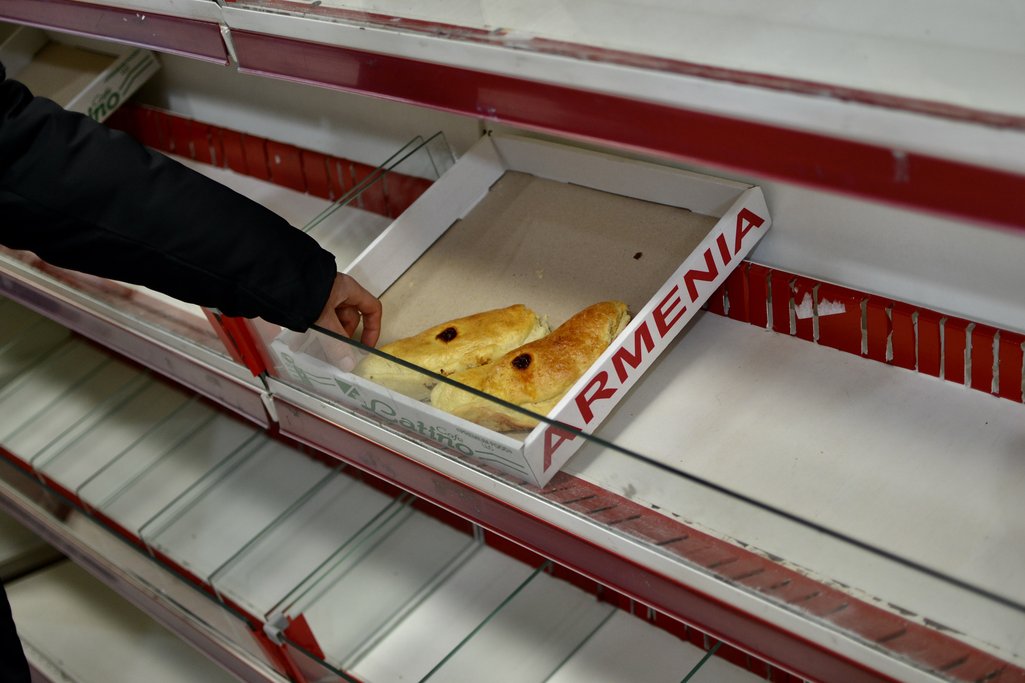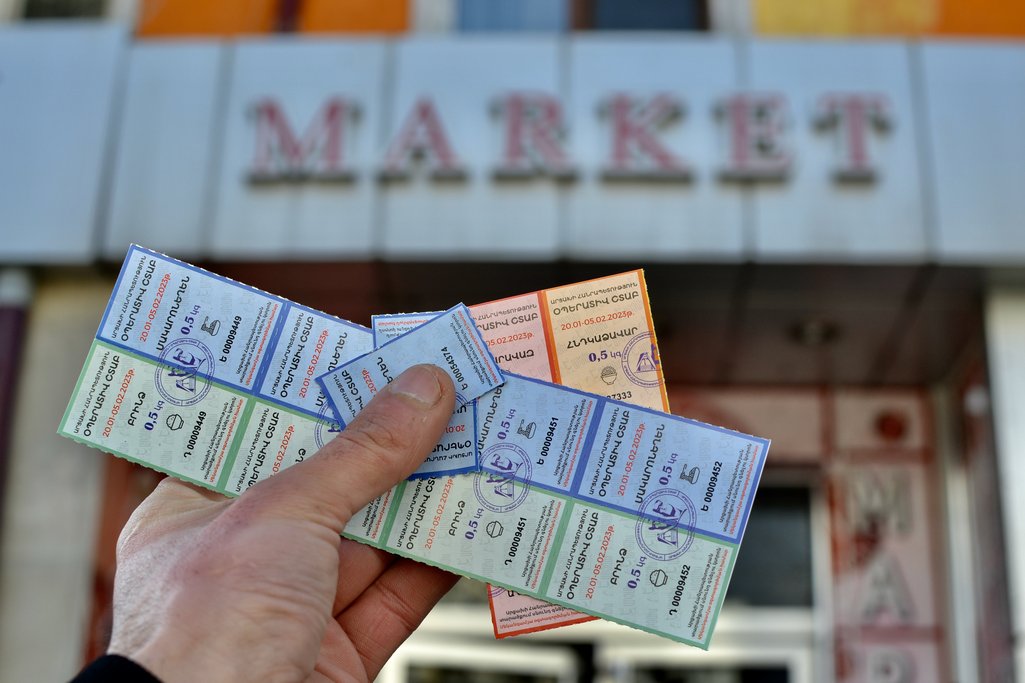An Azerbaijani journalist examines his government’s actions as the blockade of the disputed territory tightens
Bashir Kitachayev is an independent journalist and photo reporter from Azerbaijan. His main focus is on the Azerbaijani–Armenian conflict, propaganda and the politics of the South Caucasus.
Cross-posted from Open Democracy
Photo – Marut Vanyan: The only road that links Armenia and Nagorno-Karabakh has been blocked since mid-December
|
The blockade of Nagorno-Karabakh by Azerbaijani protesters claiming to be environmental activists has entered its second month, sparking a humanitarian crisis in the disputed territory and condemnation from the international community.
The Lachin corridor, the only road that links Armenia and Nagorno-Karabakh (or simply Karabakh), an ethnically Armenian region of about 120,000 people within the Karabakh mountain range in Azerbaijan, has been blocked since mid-December.
Last week, the European Parliament called on the Azerbaijani government in Baku to lift the roadblock, but so far there has been no sign of any change.
The protesters claim illegal mining is taking place on territory controlled by the self-proclaimed Nagorno-Karabakh Republic and demand that Azerbaijani specialists are allowed to monitor any mining operations. They have a well-equipped tent camp and are allowing only Russian peacekeepers and the International Committee of the Red Cross to travel on the Lachin corridor.
Civil servants, disguised military personnel and members of pro-government NGOs and youth organisations are reported to be among the so-called ‘eco-activists’, none of whom appear to have taken part in previous environmental protests in Azerbaijan. Journalists from state publications are also there to cover the roadblock.
The interruption of food and medical supplies to Karabakh has caused a humanitarian crisis. Supplies of fruits and vegetables are dwindling, stocks of baby formula have reportedly run out, and the area’s de facto authorities have issued food coupons and are rationing certain staples, such as oil, pasta, rice, sugar and buckwheat. Karabakh has also suffered interruptions in its electricity and gas supply, which passes through territory controlled by Azerbaijan.

Photo – Marut Vanyan: The interruption of food and medical supplies to Karabakh has caused a humanitarian crisis
Russian peacekeepers have been criticised by the international community for their passivity over the blockade, with a European Parliament resolution on 19 January demanding action. Peacekeepers have been stationed in the region since the end of the Second Nagorno-Karabakh War in 2020 and are meant to guarantee access to the road.
The EU resolution also condemned Azerbaijan. The day before it was adopted by the bloc’s Parliament, Estonian MEP Marina Kaljurand urged Azerbaijan to refrain from using “high-level inflammatory rhetoric” to discriminate against Armenians.
Kaljurand was referring to a recent ultimatum by Azerbaijani president Ilham Aliyev, who suggested Karabakh Armenians should either get an Azerbaijani passport or leave.
In a television interview on 10 January, Aliyev said: “Conditions will be created for those who want to live [in Nagorno-Karabakh] under the flag of Azerbaijan. Like the citizens of Azerbaijan, their rights and security will be ensured.
“For whoever does not want to become our citizen, the road is not closed, but open. They can leave. They can go on their own, or they can ride with [Russian] peacekeepers, or they can go by bus. The road [to Armenia] is open.”
Aliyev’s statement seemingly admits that Azerbaijan controls the blockade and that at least one of its goals is to take command of Karabakh, despite the country’s authorities having denied being involved in the action, which they say is a “civil society protest”.
Yet to outsiders unfamiliar with the region, the president’s offer of Azerbaijani citizenship might seem tempting. The country is rich in oil, gold and other resources, and the standard of living is, in some ways, higher than in neighbouring countries. Since the start of the war in Ukraine, Azerbaijan has increased trade with Russia while also concluding profitable gas contracts with Europe, with the president of the European Commission, Ursula von der Leyen, calling the country “a reliable partner”. Azerbaijan has also attracted foreign investors.
So why do the Armenians of Nagorno-Karabakh choose to remain citizens of a small, poor, unrecognised state, surrounded by a hostile army and dependent on supplies brought via a single road? Why don’t they believe Aliyev’s guarantees of rights and security?
Civil rights abuses
The Azerbaijan government has been repeatedly criticised by Human Rights Watch, Amnesty International, Reporters Without Borders and others for systematic human rights violations and corruption.
And in Freedom House’s annually updated Freedom in the World report, Armenia – and even the unrecognised Nagorno-Karabakh republic – far outperforms Azerbaijan in terms of human rights and democracy.
Elections at all levels in Azerbaijan are regularly rigged, meaning residents have almost no say in choosing their president, their representative in parliament or even officials in their municipality.
Opposition politicians are either not allowed to stand or have stopped criticising the authorities in exchange for security. Anti-government figures are regularly harassed or jailed on trumped-up charges – with around 100 political prisoners currently in Azerbaijani prisons, according to human rights activists.

Photo -Marut Vanyan -Rationing coupons currently in use in Karabakh
The justice system is fully controlled by the state. The police and security forces act with impunity, regularly violating human rights and national laws with bribery, beatings and torture. Earlier this month, police in Baku violently dispersed a rally in support of activist Bakhtiyar Hajiyev, who was imprisoned last December for criticising the internal affairs ministry.
Journalists are also persecuted: imprisoned, blackmailed or forced to leave the country. Even those who have fled abroad have been kidnapped or suffered assassination attempts. A draconian new media law, approved by the president last year, shows that the authorities want to destroy independent journalism.
Armenophobia
Any Karabakh Armenians who took Azerbaijani citizenship would face rampant anti-Armenian sentiment, or Armenophobia, fuelled by the state.
Both Armenia and Azerbaijan committed war crimes and ethnic cleansing during the First Nagorno-Karabakh War, which lasted from 1988 to 1994 – though both countries deny the killings committed by their own citizens. Azerbaijani propaganda has long used these crimes to feed hatred of Armenians.
Armenians are always mentioned negatively in the Azerbaijani media and are presented as vile historical enemies who betray Azerbaijanis in schoolbooks, with Azerbaijani historian Arif Yunus writing that Armenians are portrayed as “bandits, aggressors, treacherous [and] hypocritical”. He and his wife Leyla, a human rights activist, were later accused of spying for Armenia and imprisoned for more than a year in 2014. The state media alleged that Yunis’s Armenian mother had “instilled in him a hatred for Azerbaijanis”.
Azerbaijan authors have tried to justify their use of hate speech against Armenians. Tofig Veliyev, the head of the department of the history of Slavic countries at Baku State University, said he used negative expressions to convey the truth: “Such phrases create an accurate picture of the Armenians. If I had not depicted them in this way, then I would have had to distort the story.”
Azerbaijan has also tried to rewrite the history of Nagorno-Karabakh, presenting Armenians, who have lived in the region since the sixth century BC, as newcomers. The state alleges Russians resettled Armenians in the Caucasus and Karabakh in the 19th century, in order to fight the Azerbaijanis.
Azerbaijan also denies the presence of any Armenian cultural heritage in the territory. Armenian Cchurches and other religious and cultural objects have been declared by the authorities to belong to ‘Caucasian Albania’, which existed in ancient times in what is now modern Azerbaijan. Historical Armenian monuments are also periodically destroyed. The large Armenian cemetery of Julfa, on the border between modern-day Azerbaijan and Iran, was obliterated in 2005. Hundreds of khachkars (tombstones) dating from the ninth to the 17th centuries were dug up and thrown in the river.
Baku’s assurances of security guarantees are also hard to believe, given Azerbaijan did not investigate the brutal killings of Armenian civilians and captured soldiers during the Second Nagorno-Karabakh War and subsequent clashes.
And in 2012, Azerbaijani army officer Ramil Safarov was given a hero’s welcome when he returned home after beheading Armenian soldier Gurgen Margaryan with an axe at a NATO training seminar in Hungary eight years earlier. Safarov, who said he killed Margaryan out of ethnic hatred, was handed a life sentence in Budapest but extradited to Azerbaijan, where he was promptly released and pardoned.
Few rights for ethnic minorities
It is not just Armenians who are discriminated against by Azerbaijan, which claims to pursue a policy of multiculturalism and is formally a party to Europe’s Framework Convention for the Protection of National Minorities.
In reality, there are serious problems with the preservation of minority languages and cultures in Azerbaijan. Ethnic minorities make up around 10% of the country’s population, but the education system is biased towards ethnic Azerbaijanis.
Students in ethnic minority areas are meant to be able to learn their native languages but such lessons are rare, with out-of-date teaching materials and ill-prepared teachers. The exceptions are Russians and Georgians. Some national minorities (such as the Tats) can’t study their own language at all.
Similarly, Indigenous peoples are barely mentioned in history textbooks. One book used in schools teaches students that Azerbaijani Turks are “the Indigenous population of the Caucasus and, in particular, Nagorno-Karabakh, as they lived there from the first millennium BC”. In fact, modern-day Azerbaijan was once inhabited by tribes speaking north-east Caucasian languages and Armenians. The active resettlement of Turks began only in the tenth century.
Political and economic power is also still concentrated in the hands of ethnic Azerbaijanis, even in areas densely populated by minority peoples. The Talysh, an Iranian ethnic group, can’t use the word ‘Talysh’ on restaurant signs or in local history books, and there is not a single regional TV programme in the Talysh language.
Those who try to draw attention to such difficulties face repression, accusations of separatism and sometimes worse. Journalist Novruzali Mammadov and historian Fakhraddin Abbasov, both prominent Talysh activists, died in prison in 2009 and 2020 respectively. Other Talysh activists have suggested both men were political prisoners and that their deaths were suspicious. Similar cases have occurred with Lezgin and other ethnic minority activists.
Meanwhile, Azerbaijan is assimilating territories inhabited by Indigenous peoples, and demanding Russian peacekeepers use Azerbaijan names for towns and villages in Armenia.
Is peace possible?
It is hardly surprising that Karabakh Armenians do not want to take up Baku’s offer of citizenship.
But a safe life for Karabakh Armenians in Azerbaijan is possible – in theory, at least. Many Azerbaijanis are tired of enmity and war, they want a peaceful life and believe they can coexist with Armenians.
But the country must take real steps towards democracy and reject a national-patriotic identity based on hatred of Armenians. Azerbaijan is exacerbating a humanitarian crisis in Nagorno-Karabakh, when it could be creating conditions for peace between the two countries.



Be the first to comment